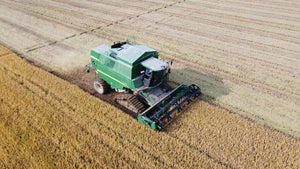Innovation in rice production: towards a sustainable future
The rice industry is undergoing a momentous transformation thanks to technological innovation and scientific research. New cultivation techniques and improved varieties are revolutionizing the sector, making it more efficient and environmentally friendly.
New rice varieties: higher yields and greater resistance
Genetic research has led to the creation of high-performance rice varieties, such as Okris and Rubinum , designed to offer higher yields and greater pest resistance. These new varieties reduce pesticide use, improving crop sustainability and promoting healthier, more ecosystem-friendly production.
In addition to these, the IRES research center has developed innovative varieties that are attracting attention in the sector:
- Ebano Rice : the first aromatic black rice with a very short growing cycle, ideal for organic and sustainable farming.
- Grancavour rice: first risotto rice with giant aromatic grains, with an intense aroma and a cooking time of 18-20 minutes.
Precision agriculture: optimizing resources
One of the most important developments is precision agriculture, which uses sensors, drones, and data analysis systems to optimize water and fertilizer use. Thanks to these technologies, farmers can reduce waste and improve production efficiency, minimizing environmental impact and ensuring superior rice quality.
IRES is strongly committed to developing advanced techniques to improve crop efficiency, aligning with European strategies for sustainable food production, such as the "farm to fork" program.
Advanced post-harvest processing techniques
Innovation continues even after the harvest: new methods of selecting and processing rice ensure higher quality for consumers. Improvements in refining, preservation, and packaging help preserve the product's nutritional properties and flavor, meeting the growing demand for healthy and sustainable foods.
Towards a more sustainable future
The evolution of the rice sector is not limited to research and technology, but also involves cultivation and production practices, which are increasingly geared towards sustainability. The combination of new varieties, advanced technologies, and environmentally friendly methods is shaping a future in which rice production will be more efficient, environmentally friendly, and capable of producing high-quality products.

